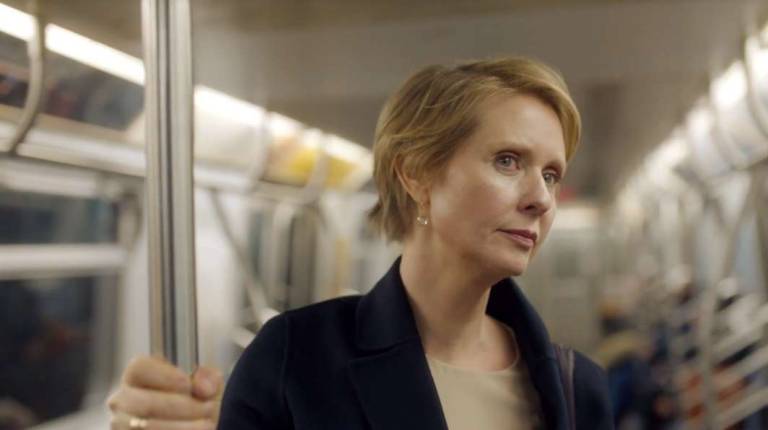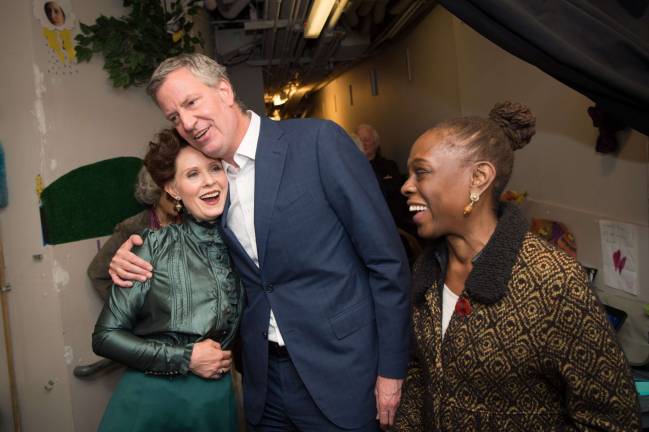CYNTHIA NIXON'S GUBERNATORIAL GAMBIT


It is now official: Conjuring up her humble upbringing — living in a one-bedroom, fifth-floor Yorkville walk-up with a single mom — lifelong New Yorker Cynthia Nixon declared on Monday that she was running to unseat Governor Andrew Cuomo in the Democratic primary.
“I love New York,” she said in a gauzy, two-minute political video statement unveiling her candidacy. “New York is my home. I’ve never wanted to live anywhere else.”
As the camera portrayed her descending into a subway station, waiting on a platform, taking a train, walking purposefully down city streets, she got straight to the point. “Our leaders are letting us down,” Nixon said. She didn’t mention any names.
But she briefly explored themes that have been the calling card of her No. 1 political ally and top Cuomo nemesis, Mayor Bill de Blasio, saying that the Empire State has become the “most unequal state in the entire country with both incredible wealth and extreme poverty.”
And she demanded, “How did we let this happen?” Nixon’s response to her own rhetorical question: “Something has to change,” and she called on “government to work again on health care, ending mass incarceration, fixing our broken subways.”
It wasn’t particularly subtle. “We are sick of politicians who care more about headlines and power than they do about us,” she said. “It can’t just be business as usual anymore.”
Does she have a chance? Well, Nixon’s announcement came out on the same day a Siena College poll found Cuomo would trounce her by a 66-to-19 margin among registered Democrats.
On the other hand, consider another series of numbers that are retro and stark and could possibly portend change in a political climate shifting toward the empowerment of women:
Starting with George Clinton in 1777 and continuing all the way up to Cuomo, New York has had 56 governors in 241 years — and not a single one has been a woman.
More than 2,000 governors have held office across the U.S. since the founding of the republic – and all but 39 have been men, according to data provided by the Center for American Women and Politics.
And today? Nearly a century after women got the vote nationwide, the 50 statehouses boast only six women governors — two Democrats and four Republicans, or 12 percent — down from a peak of nine in 2007.
Expect that tally to rise, perhaps dramatically, in November, fueled by the #MeToo movement, a surge in political fundraising for women and the drive to fix, or supplant, a broken male-dominated system.
Indeed, 80 female candidates have either filed to run in the 2018 gubernatorial elections or are likely to do so – and if that number holds, it will shatter the record of 34 women who filed in 1994, CAWP says.
Enter Cynthia Nixon, a longtime Upper West Sider, one of the most gifted Broadway performers of her generation, part of a quartet that rocketed to global fame with “Sex and the City,” and perhaps the only candidate whose theatrical portrait adorns the wall of Sardi’s.
The 51-year-old public school advocate, LGBT activist, left-of-center progressive — and longtime friend and supporter of de Blasio – will face enormous hurdles in her insurgent challenge to Cuomo.
A two-term incumbent who has made no secret of his quest to lock up a third term by a landslide margin, Cuomo has amassed a bloated $30.5 million campaign account to do just that, so he won’t be easy to topple.
LIFE AFTER MIRANDABut Nixon — Hunter College High School, class of 1984, Barnard College, class of 1988 — is the classic New York success story, the overachieving child actor who made her TV debut in 1976 as a 9-year-old imposter on “To Tell the Truth,” and any uphill, upstart campaign she undertakes cannot be so easily dismissed.
Best known for inhabiting the role of Miranda Hobbes, the long-single, later-married, working attorney-mom she created for HBO’s “Sex and the City” from 1998 to 2004, she changed course almost from the moment the series came to an end, embarking on a very personal de-Hobbesification process.
First, Nixon returned to her first love, the theater, not that she’d ever really left it, winning two Tony Awards, for “Rabbit Hole” in 2006 and “The Little Foxes” in 2017, and a third Tony nomination. Along the way, she scooped up two Emmys and a Grammy.
Her private life also evolved. In 2003, she had broken up with boyfriend Danny Mozes after a 15-year relationship that produced two children, including daughter Samantha, who was bat mitzvahed at B’nai Jeshurun Synagogue on West 88th Street.
By 2004, she had fallen in love with a woman who she met at a rally to support public education, Christine Marinoni, then the director of the Alliance for Quality Education, a union-backed advocacy group that’s long blasted Cuomo for his support of charter schools.
And in very theatrical fashion, Nixon trumpeted their engagement on a street corner, Sixth Avenue and 45th Street, during the “Love, Peace and Marriage Equality Rally” in May 2009 to support same-sex marriage, which had yet to be legalized. Two years later, the couple had a son, and in 2012, they wed.
“It’s the perfect personal and professional resume,” said Lisa Wagner, a paralegal and actor active in gay politics in Chelsea who said she found inspiration both in Nixon’s life story and that of the fictional Miranda.
“I’d vote for her if she ran for borough president or mayor or governor or president or anything else you can think of,” Wagner added.
POLITICAL PATRON AT CITY HALLOf course, Nixon will need big-time help mastering the nuts-and-bolts of a maiden campaign as she plunges into the fray. In addition to multi-million dollar fundraising, she’ll have to circulate nominating petitions, collect 15,000 legitimate signatures statewide in a five-week window between June 5 and July 12 and meet numerous state Board of Election filing deadlines.
And that’s where the de Blasio connection comes in: “The view of the statehouse is that she’s a creature of the mayor,” said George Arzt, the Democratic political strategist who served as Mayor Ed Koch’s third-term press secretary.
In fact, Nixon has lined up Bill Hyers, the manager of de Blasio’s 2013 campaign, and Rebecca Katz, a longtime aide, both of Brooklyn-based Hilltop Public Solutions, and was recently spotted with an associate of Hyers and a camera crew filming on the streets of SoHo.
Shortly before she declared her candidacy, Katz said it was “premature” to discuss any political endeavors and referred calls to a Rebecca Capellan, a Nixon publicist who has worked on Tony and Emmy campaigns. Capellan didn’t return messages.
Will de Blasio go to the mat for Nixon, who has campaigned for him, contributed to his races, huddled with him at City Hall and took the stage at his inaugurations in 2014 and 2018?
“The mayor will not be front and center, but he’ll operate behind the scenes and through surrogates,” Arzt said. “He doesn’t want more of an all-out war with the governor than he already has.”
If Nixon hopes to vie in the September 13 primary, she’ll need to find a rationale for dislodging the incumbent:
“You need a stellar argument, lots of money, plenty of experience, and huge numbers of people who will turn out for you,” said Democratic political consultant Hank Sheinkopf, who has worked on the campaigns of Bill Clinton and Mike Bloomberg and helped derail Cuomo in his failed gubernatorial bid in 2002.
“The rationale for running against him from the left is hard to find when he’s passed gay marriage, stopped fracking and enacted the toughest gun laws in the country,” he added. “It can’t just be that de Blasio wants to give the governor a headache.”
How will the New York electorate cotton to an actor-turned-politician-and-would-be-dragon slayer as she morphs into a serious candidate?
“California has a tradition of going to the stage or the screen to pick its leaders – think Ronald Reagan, George Murphy, Sonny Bono, Clint Eastwood, even a body-builder like Arnold Schwarzenegger,” said Mitchell Moss, professor of urban policy and planning at New York University and an occasional adviser to the Cuomo family.
“In New York, we tend to pick people from the real world, not the fantasy world,” Moss added. “We pick doers, not performers.”
Douglas Feiden: invreporter@strausnews.com